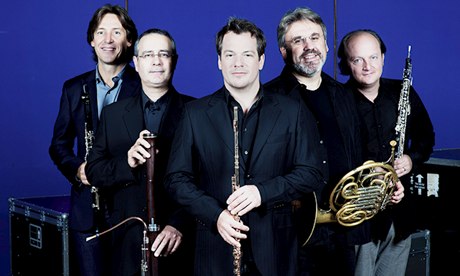
Les Vents Français is the wind-quintet equivalent of a supergroup. All its members – who include the flautist Emmanuel Pahud, oboist François Leleux and clarinettist Paul Meyer – are international soloists in their own right, and their performances, as you'd expect, have a marvellous fluency and dazzling range of colour, even if there are moments when things get too indulgent.
Though today's French style of wind-playing is not nearly as distinctively reedy as it was 100 years ago, there is something about the brittle charm of French music from the first part of the last century that still seems to suit the wind quintet perfectly. That's demonstrated beautifully by the first of the two discs in this collection, especially in miniatures such as Jacques Ibert's Trois Pièces Brèves and Darius Milhaud's La Cheminée du Roi René, a suite adapted from a film score. The arrangement of Ravel's Tombeau de Couperin as a wind quintet, however, seems unnecessary when bespoke pieces abound.
A couple of less well-known French works are included, too. Music by André Jolivet, who in the 1930s was a member with Messiaen of a group of composers who called themselves La Jeune France, is rarely heard now, so his Sonatine for oboe and bassoon, comprising three terse, hieratic movements, is welcome. Elsewhere, the Wind Quintet by Paul Taffanel, still revered by flautists as one of the most influential teachers of the early 20th century, is a real curiosity, even though it does suggest he was wise to concentrate on his day job.
The other disc ranges far more widely. Ligeti's Bagatelles for wind quintet and Sandor Veress's Sonatina for oboe, clarinet and bassoon, offer a fascinating comparison between the music of pupil and teacher, and the different ways in which each absorbed the influence of Bartók, while Hindemith's Kleine Kammermusik and Zemlinsky's late Humoresqe belong to totally different worlds. Samuel Barber's Summer Music provides a link between the two discs; there's a real French elegance to its evocative neo-romanticism, and Les Vents Français, Leleux especially, capture that perfectly.

